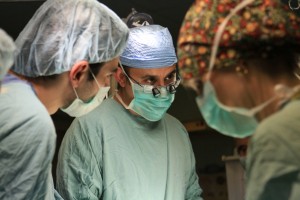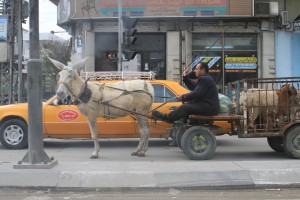Washington doctors in Gaza continue work with clinics, surgery and lectures
(This is Part 4 in a series. For the next several days, Gerri Haynes, a former president of Washington Physicians for Social Responsibility, will be sending back reports from inside blockaded Gaza. As she did twice before, Gerri has organized a team of doctors and other health care providers to work in hospitals and clinics in Gaza in an effort to directly help the people there and to bring attention to the ongoing humanitarian crisis that the Israeli blockade has created.)
In Gaza, women are working to preserve and improve life in every possible way.
This afternoon, I met with the director of The Palestinian Developmental Women Studies Associations. Dr. Abu Dagga spent two years in an Israeli prison (1968-1970) and now works with women in Gaza who are ex-prisoners – seeking to improve their lives through counseling, education and rehabilitation. Her center conducts research on the needs of women and provides opportunities for youth to be educated to serve the people of Gaza. Seeking not to follow political rhetoric, the Center’s mission is to speak for all Palestinians and serves women from all over Gaza.Steve Gilbert’s lecture this morning on toxicology raised many questions about lead and the problems caused by lead. Here, the gasoline burned in cars and generators contains lead (no lead-free gas) and the particles released from the thousands of individual generators are likely the source increased environmental toxicity. Simple precautions can decrease individual lead exposure: hand washing, not wearing shoes in homes and damp-dusting home surfaces, but source prevention is critical.
Steve will be meeting throughout the week with medical and environmental personnel and hopes to help build a Palestinian toxicology society. The environment of Gaza is polluted from so many sources that concentrated work will be required to create environmental safety.Part of the discussion I had with Gaza Community Mental Health Programme personnel this morning involved strategies for removal of garbage from the streets – and how a visually cleaner environment might help to create a more hopeful sense in the community. For now, the streets and roads are covered with litter – signs of despair.
Again today, the urologic surgery teams in our group operated through the day.
The evening was highlighted by a gathering with physicians from Palestinian Medical Relief and short talks by Bob Haynes, Steve Gilbert, Don Mellman, Gerri Haynes and Ismael Zamilpa.
The medical community in Gaza is expert, but some specialties are not available here and the siege prevents access to new equipment and adequate supplies.
RSS feed for comments on this post. TrackBack URI

